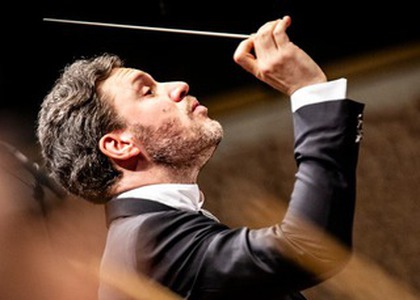> Events

LIVE from Wolfsburg: Commemorative concert marking 80 years since the end of World War II
A concert with a variety of meanings and sub-meanings takes place on May 16th in the German city of Wolfsburg, commemorating the 80th anniversary of the end of World War II. It is one of a series of two concerts given by the North German Broadcasting Philharmonic Orchestra in Hanover conducted by its principal conductor Stanislav Kocianovski. They are preceded by an educational project entitled Never Again! in which the North German Broadcasting Corporation in Hannover has familiarized high school seniors with the score of Dmitri Shostakovich's 7th Leningrad Symphony, explaining the historical background of the period in which the score was composed, and culminating in their participation in the dress rehearsal of the concerts on May 15th.
Radio România Muzical is (once again) the only station in the European Broadcasting Union network that will broadcast live the first of the two concerts, with cellist Pablo Ferrández as soloist (the second concert takes place in Hannover, with Alexey Stadler as soloist).
On the program - Hebrew Rhapsody Schelomo (Solomon) for cello and orchestra by Ernest Bloch and Symphony VII Op. 60 in C major Leningrad by Dmitri Shostakovich. Two works that, through their music, speak to us about the suffering of people in wartime.
Ernest Bloch is recognized as one of the most important Swiss composers, his works reflecting his Jewish roots. The Rhapsody was first composed and performed during the First World War.
Prominent Russian composer Dmitri Shostakovich, died 50 years ago, and the music world is paying tribute to him this year, with his works more frequently featured on the programs of major orchestras. The symphony on the evening of May 16th was composed during the Nazi siege of Leningrad/St Petersburg (Shostakovich's hometown) during World War II (1941) and was first performed in 1942, in the city itself, still under siege. The Russian composer used to encode messages in his music, and this score is no exception, including a quotation from his Lady Macbeth of Mtsensk, a work that had displeased Stalin and brought Shostakovich under the scrutiny of the Bolshevik authorities.
About Stanislav Kocianovski I can only tell you for now that he was born (like Șostakovici) in St Petersburg and that since 2017, when he made his debut at the Verbier Festival, he has become a regular guest of major European philharmonic and opera houses.
Wolfsburg, the town in the state of Saxony land where the concert takes place, was founded by the Nazi regime on 1 July 1938, built from scratch on what used to be a former field for Volkswagen workers producing the KdF, a cheap mass-produced car that was manufactured until 1945 as part of the Kraft durch Freude (Power through Joy) program. During the Second World War, cars, airplanes and military equipment were produced in Wolfsburg, mainly using prisoner-of-war labor as well as forced-labor camp labor.
Therefore, I invite you on Friday, May 16th, at 9 pm, on the programme European Stage on Radio România Muzical, to watch, live from the Scharoun Theatre in Wolfsburg, a concert in which we will decode the messages of the creators in their works, but also those of the organizers who conceived this series of concerts with profound meanings.
Translated by Miruna-Andreea Vartic,
University of Bucharest, Faculty of Foreign Languages and Literatures, MTTLC, year I
Corrected by Silvia Petrescu














